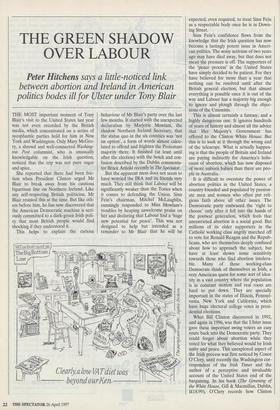THE GREEN SHADOW OVER LABOUR
Peter Hitchens says a little-noticed link
between abortion and Ireland in American politics bodes ill for Ulster under Tony Blair
THE MOST important moment of Tony Blair's visit to the United States last year was not even recorded by the British media, which concentrated on a series of sycophantic parties held for him in New York and Washington. Only Mary McGro- ry, a shrewd and well-connected Washing- ton Post columnist, who is unusually knowledgable on the Irish question, noticed that the trip was not pure sugar and spice.
She reported that there had been fric- tion when President Clinton urged Mr Blair to break away from his cautious bipartisan line on Northern Ireland. Like any self-respecting British politician, Mr Blair resisted this at the time. But like oth- ers before him, he has now discovered that the American Democratic machine is seri- ously committed to a dark-green Irish poli- cy that most British people would find shocking if they understood it.
This helps to explain the curious behaviour of Mr Blair's party over the last few months. It started with the unexpected declaration by Marjorie Mowlam, the shadow Northern Ireland Secretary, that the status quo in the six counties was 'not an option', a form of words almost calcu- lated to offend and frighten the Protestant majority there. It finished (at least until after the election) with the botch and con- fusion described by the Dublin commenta- tor Bruce Arnold recently in The Spectator.
But the apparent mess does not seem to have worried the IRA and its friends very much. They still think that Labour will be significantly weaker than the Tories when it comes to defending the Union. Sinn Fein's chairman, Mitchel McLaughlin, cunningly responded to Miss Mowlam's troubles by heaping unwelcome praise on her and declaring that Labour had a 'huge new potential for peace'. This was not designed to help but intended as a reminder to Mr Blair that he will be
Clearly, a low-VAT diet was beyond our Ken.
expected, even required, to treat Sinn Fein as a respectable body once he is in Down- ing Street.
Sinn Fein's confidence flows from the knowledge that the Irish question has now become a lastingly potent issue in Ameri- can politics. The noisy activism of two years ago may have died away, but that does not mean the pressure is off. The supporters of the 'peace process' in the United States have simply decided to be patient. For they have believed for more than a year that nothing can be resolved until after the British general election, but that almost everything is possible once it is out of the way and Labour has a majority big enough to ignore and plough through the objec- tions of the Unionists.
This is almost certainly a fantasy, and a highly dangerous one. It ignores hundreds of years of history and almost all the advice that Her Majesty's Government has offered to the Clinton White House. But this is to look at it through the wrong end of the telescope. What is actually happen- ing is that the people of Britain and Ireland are paying indirectly for America's holo- caust of abortion, which has now disposed of more unborn babies than there are peo- ple in Australia.
It is difficult to overstate the power of abortion politics in the United States, a country founded and populated by passion- ate men and women who often put reli- gious faith above all other issues. The Democratic party embraced the 'right to choose' only after it fell into the hands of the postwar generation, which feels that unrestricted abortion is a social good. But millions of its older supporters in the Catholic working class angrily marched off to vote for Ronald Reagan and the Repub- licans, who are themselves deeply confused about how to approach the subject, but have at least shown some sensitivity towards those who find abortion intolera- ble. Many of these working-class Democrats think of themselves as Irish, a very American quest for some sort of iden- tity in a vast country where the population is in constant motion and real roots are hard to put down. They are specially important in the states of Illinois, Pennsyl- vania, New York and California, which have huge electoral college votes in presi- dential elections.
What Bill Clinton discovered in 1992, and again in 1996, was that the Ulster issue gave these important swing voters an easy route back into the Democratic party. They could forget about abortion while they voted for what they believed would be Irish unity and peace. This unexplored aspect of the Irish process was first noticed by Conor O'Clery, until recently the Washington cor- respondent of the Irish Times and the author of a perceptive and invaluable account of the United States end of the bargaining. In his book (The Greening of the White House, Gill & Macmillan, Dublin, U18.99), O'Clery records how Clinton began to play the Irish card in the summer of 1992, when he flirted with Ray Flynn, then mayor of Boston, drinking pints of Guinness with him in Irish bars:
The 53-year-old Boston mayor, a former all- American basketball player, later accompa- nied Bill and Hillary Clinton to the Catholic Notre Dame University in South Bend, Indi- ana, to reassure the audience that the pro- choice [i.e. pro-abortion] candidate was worthy of their support. 'The first question there,' Flynn recalled, 'and Governor Clin- ton was very astute in anticipating it, was, "What do you say to those people who want change, but don't believe they are welcome in the Democratic party because it's not a party for people who are pro-life [i.e. anti- abortion]?" ' 'Governor Clinton replied, "Well, I just have to disagree with that because the national co-chair of the Clinton for President Com- mittee is standing right next to me. He just happens to be Ray Flynn, President of the US conference of Mayors, who just happens to be pro-life."'
It was the start of an electoral triumph. Yet only a few months before, as O'Clery recorded, a tired and dispirited Clinton had almost cancelled a meeting with Irish lobbyists in New York. And when he did eventually go, he was so ignorant of the issues that he allowed himself to be manoeuvred into a series of dangerous commitments — including a visa for Gerry Adams. This meeting would turn out to be a Faustian pact from which he could never escape. Now it is quite likely that Clinton's successors, both Democrats and Republi- cans, will compete for this newly awakened Irish vote for the foreseeable future, at the expense of Ireland and of Britain, whose interests have never been seriously consid- ered. One evil has begotten another.
Oh, to be in England now that spring is here.



































































 Previous page
Previous page